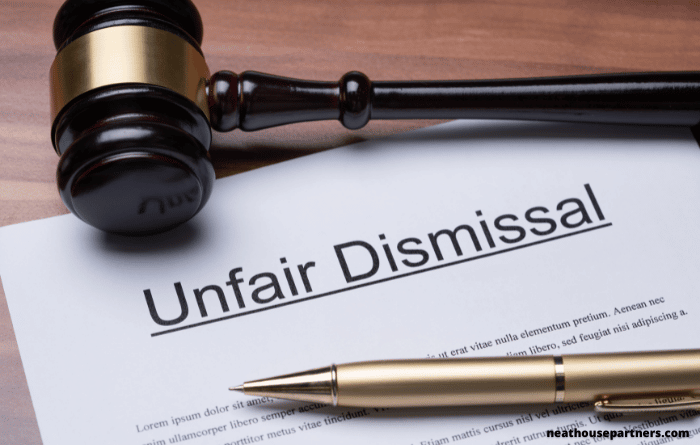Fire and Rehire: Everything You Need to Know
Make sure to get in touch with us if you have any questions about fire and rehire or you are facing a potential lawsuit so we can discuss your situation.
James Rowland
Commercial Director James leads Account Management, Sales and Marketing at Neathouse Partners.Date
12 November 2021Updated
12 August 2024
Table of contents
Related articles
Tags
Fire and rehire is a strategy sometimes used by employers to change the terms of their employees' employment contracts. It is a fairly straightforward idea: the employer terminates a worker's contract, then immediately hires him or her back with different terms. There are various reasons why an employer may want to legitimately do this but there are strict legal guidelines about when it can be done.
If you decide to fire and rehire your employees but they feel like their rights have been abused, you could be facing a lawsuit that could have serious legal, financial and reputational consequences for your business.
In this article, we will explain what fire and rehire means, in what situations it is used, and how to do it legally. We will also explain the legal assistance available to you if your employee files a lawsuit against you and examine some notable examples of fire and rehire tactics from famous businesses.
What Does "Fire and Rehire" Mean?
The first thing to note is that the term "fire" in this context is a bit of an exaggeration. It means that the employer terminates the employment relationship with one or more employees, then immediately rehires them into new positions on different terms and conditions. This usually does not mean they are fired; instead, their contracts are simply amended to reflect any changes which were mutually agreed upon between both parties.
Why Do Employers Fire And Rehire?
There are various reasons why you may decide to fire and rehire your staff. For example, you may be closing a branch of your business and offering employees redundancy packages. If they take the offer and leave, you can rehire them as freelancers or consultants to work from home instead.
Alternatively, it may simply be that times have changed since an employee was hired with certain expectations about their wages or working hours which no longer apply in today's market. In this case, firing and rehiring may be preferable to laying off workers. As long as the workers understand and accept the terms then this can be a mutually beneficial arrangement, particularly if there is an understanding that the terms of workers' contracts could be revisited again later if the financial landscape improves.
When Is Fire And Rehire Legal?
Fire and rehire is legal when two conditions are met:
- Both employer and employee must agree to the arrangement beforehand.
- New contracts must reflect all changes agreed upon between both parties.
One of the most important conditions to remember is that as well as your employee agreeing with the changes before you execute them, they should also have the chance to consult their lawyer or trade union on their legal rights in advance of accepting the new contract. Firing an employee without these steps being taken could mean that they will be in a position to file a lawsuit against you for unfair dismissal.
Here are four common situations where fire and rehire may be appropriate:
- Both parties mutually agree to changes in terms of employment, usually following negotiations with a trade union or an employee representative if one exists.
- There needs to be a change to a term or condition of an individual's contract without their consent. For example, the contract may have become unsustainable due to changes in the industry or how work is done. Before implementing this change without consent you should carefully consider whether it would be better to just lay them off rather than firing and rehiring under different terms.
- There has been a "material" change in working practices which requires agreement between both parties, such as relocating offices to another city or country where it is no longer possible for workers to commute, causing them hardship.
- An older worker has been made redundant but they still possess skills that will benefit your company moving forward. You can offer a new job at reduced pay with fewer hours as long as their agreement was obtained beforehand.

What Are the Ramifications For Unlawful Fire and Rehire?
If you fire your employees without consulting with them first or following all steps outlined above, you could be sued by them for unfair dismissal. In this case, you would have to pay the employee compensation in line with applicable laws and regulations.
Employers who fire an employee for no good reason or rehire them unlawfully face consequences from their victim as well as employment tribunals - including potential compensation claims which could amount to many months' salary plus interest. This is why it's important not only to consult your employees about making changes but also to make sure there are very specific clauses in contracts which mean either party can terminate at will with sufficient notice. This can be as simple as saying "we will terminate your contract with x amount of notice if either party wishes to".
If you are sued for fire and rehire, you may also be required to give a written statement within 28 days of being served notice explaining why your employees were fired then rehired or risk having a fine levied upon you as well.
Even if it is decided that you did everything correctly, there could still be negative consequences such as lost business opportunities or damage to your company's reputation, both of which could impact your bottom line. This means it really isn't worth taking unnecessary risks when implementing changes to contracts involving staff members.
What Can You Do if You are Sued by an Employee?
Employers can file a defence if they are sued for either unfair dismissal or unlawful rehire. A successful defence will usually depend on whether you followed all of the steps above and consulted your employees before making changes to employment terms and conditions.
If you are sued by an employee or ex-employee, the best thing to do is to speak to a legal expert with experience in fire and rehire cases.
At Neathouse Partners, we have extensive experience with all types of employment law and would be happy to discuss your case and explain your best course of action.

How can you Fire and Rehire Without Damaging Your Business's Reputation?
The best way to avoid potential lawsuits or other negative repercussions is to make sure that your contracts reflect that your employee agrees with any changes before you implement them. This means having a clause in their contract which indicates their agreement as well as what can be done if it becomes necessary for either party to terminate or amend existing conditions.
As noted above, this is best achieved with specific clauses in the contracts which make it clear that either party can terminate employment at any time, or if there is a material change in working practices to be agreed upon between both parties. Then you must consult with your employees and give them 28 days to respond before making any changes. This may also mean including giving them written notice of termination unless they accept the proposed changes and the drawing up of a new contract.
What was the Covid-19 Pandemic's Impact on Fire and Rehire?
The Covid-19 pandemic was a major factor in why some employers used "fire and rehire" as part of their workforce reduction strategies. According to the Trade Union Congress, 10% of British workers were faced with the threat of being fired and rehired during the Covid-19 Pandemic. Young workers and those from BAME backgrounds were at most risk of fire and rehire, and potentially discriminatory actions could also be levelled at employers if age or ethnicity was thought to be a deciding factor.
Many companies cited the need to renegotiate workers' contracts rather than dismissing them outright as a difficult but necessary measure due to the effect of Covid-19 on their industries. However, many people were sceptical given the enormous profits some of the companies had been making before the pandemic and the huge bonuses that were still paid to executives and shareholders despite the cuts to wages and benefits.
Some of the major companies involved in fire and rehire during the pandemic were:
British Airways
BA cited the existential danger to their business caused by international travel restrictions. The trade union representing Heathrow Airport cargo handlers was eventually able to come to an agreement with the airline which saw BA scrap its plans to fire and rehire the workers on significantly unfavourable terms.
Weetabix
After it became clear that Weetabix was planning to fire and rehire many of its staff on terms which could have seen some losing £5,000 a year, Weetabix factory workers across the UK went on strike. These protests caused huge disruption to the cereal giant's operations with workers pointing to Weetabix's 20% rise in profits in 2020. These protests have continued up to the time of writing with the workers union, Unite, yet to reach an agreement with the company.
British Gas
In April 2021, British Gas fired hundreds of engineers who refused to accept significantly inferior terms when the company attempted to fire and rehire them. The engineers' union GMB had organised 43 strikes between the time the terms were offered to the engineers and the eventual mass sackings, which brought renewed public attention to fire and rehire tactics.
What Other Important Unfair Dismissal Rules Are There?
There are a number of other rules that employers must follow when dismissing staff, and all of these can potentially result in unfair dismissals under UK law. These include:
- Failure to give the required amount of notice before terminating employment.
- Not allowing employees to appeal against dismissal decisions they feel were wrongfully made or not following correct procedures for disciplinary hearings, where applicable.
- Failing to investigate allegations surrounding an employee's conduct thoroughly enough before making a decision about their future with your business etc.
- Failing to consult with relevant trade unions regarding redundancies and layoffs.

What Are Some Positive Ways of Reducing Staff?
Many companies have successfully reduced their workforce without resorting to "fire and rehire" tactics by offering early retirement schemes, job-sharing arrangements, or hybrid working. Another way to reduce your business's overall headcount is to invest in automated machinery or technologies that will free up time for employees so they are able to complete less menial tasks - freeing them up instead for more important roles.
You may even want to consider outsourcing certain aspects of your company if it makes sense financially, just make sure you know what levels of employer responsibility (if any) you have towards the subcontractors who are doing work for your company.
What Are Some Negative Ways of Reducing Staff?
Finally, another common mistake that companies make when wanting to reduce their workforce numbers is taking the decision too quickly without consulting employees or unions first. This can lead to huge resentment amongst the staff who you keep on, which could cause them to abandon your business at a later date when things have settled down again and other roles become available.
It is important to gauge the feeling of your employees before you offer any significant changes to their contracts and also to fully analyse the potential fallout of personnel restructuring. Your employees may feel like they have no choice but to accept, at least for the time being, but you could end up with a lot of unhappy people working for your company.
Final Thoughts
Fire and rehire is a hot topic but as long as you follow all of the requisite steps, you should have no issue with reconsidering the terms of your employees' contracts. This may be for the benefit of your business, your workers or both, but the important thing is that everything is done transparently and that your employees are informed and consulted every step of the way.
Make sure to get in touch with us if you have any questions about fire and rehire or you are facing a potential lawsuit so we can discuss your situation.
Related blog posts

What You Need To Know About Contracts Of Employment

Employment Status: A Worker, An Employee Or Self-Employed?

Discipline Within The Workplace
Unlawful Deduction of Wages

Enforcing Restrictive Covenants
Have questions?
Get in touch today
Contact us, and our team will get back to you within 24 hours. We value your questions and are committed to getting them answered quickly.


Hello! I am Nicky
Just fill in the form below with your details, and I will arrange for a member of our team to give you a call.
By clicking, you agree to our Privacy Policy



